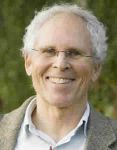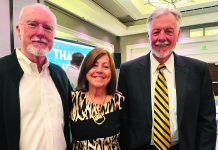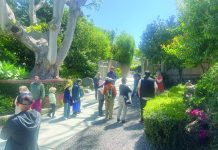Laguna Rotary Means Business on Climate Change

“Imagine the Earth as our patient,” local physician Gary Stewart told an audience of some 30 Laguna Beach Rotarians at their March luncheon meeting. “First, we would check the planet’s vital signs. The earth is developing a fever, and in geologic time, very rapidly. The planet’s breathing is also disturbed. Carbon dioxide levels are still cycling up and down each year, as growth in the spring pulls CO2 from the atmosphere, and then lets it back out in the fall die-off, but the overall level of carbon dioxide is consistently going up and up, every year,” warned Dr. Stewart, referencing fossil fuel burning and continued rainforest loss.
In this fashion, Dr. Stewart took the members of the service club through the systematic steps a physician has been trained to follow, only applying those steps to the planet, a replica of which he held while talking. His medical diagnosis, and that of the world’s leading scientists, he noted, is that excessive carbon emissions are pushing upward both ocean and terrestrial temperatures to levels unhealthy for life. The prognosis, he said, was not good unless we begin making substantial and immediate reductions in carbon emissions while turning to sustainable, non-fossil-based energy. His prescription: Congress must put a price on carbon so that the damaging environmental effects of burning fossil fuels would be accurately and openly reflected in their cost to the public relative to the use of wind, solar, and other sustainable forms of energy. To drive home his point, the speaker quoted what conservative economist Milton Friedman told Phil Donohue in 1979: the “best way” to protect against pollution “is to impose a tax on the amount of pollutants emitted… and make it in the self-interest of the… manufacturers and of the consumers to keep down the amount of pollution.”
Dr. Stewart specifically mentioned the importance of Congress passing The Energy Innovation and Carbon Dividend Act (HR 763), which would dramatically reduce carbon emissions—a nearly 40% reduction in 12 years according to Columbia University economists. Passing this measure would create 2.1 million green jobs and save lives that would otherwise be lost due to peoples’ respiratory ailments, such as asthma, linked to breathing polluted air.
The speaker aptly and skillfully wove into his talk how the subject matter meshed well with Rotary’s time-honored values and leadership in promoting public health. For example, Rotarians have a four-way test for action: Is it the truth? Is it fair to all concerned? Will it build goodwill? Will it be beneficial to all concerned? Human-generated global warming is unarguably the truth, attested to by nearly all credentialed, peer-reviewed climate and marine scientists. It is indeed fair to provide the public with vital information from expert sources unaffiliated with interests tied to the fossil fuel industry. Goodwill results from reaching out to all businesses, including oil and gas, and members of all political parties to address the climate emergency. Finally, nothing could be more beneficial to all concerned than providing the next generations with a habitable planet.
After the presentation, which I attended as a local leader in Citizens’ Climate Lobby, members asked questions of the speaker. Three of the Rotarians in attendance expressed interest in working with Dr. Stewart and other climate lobbyists to secure Congressional approval of the carbon fee and dividend measure mentioned above. I would add that recently 3,558 economists, 27 of whom are Nobelists, endorsed this approach to the climate crisis. Dr. Stewart asked me to direct readers to energyinnovationact.org to learn about the bill’s main features.
Kudos to the Laguna Beach Rotary Club whose civic-minded business leaders hosted this timely and highly informative event, which was also fun.
Tom Osborne is a retired history professor and author of four critically acclaimed books and numerous journal and newspaper articles. He is currently writing a history of environmentalism in California. Email: [email protected]





For those of us who missed the Rotary meeting, thank you Tom for reiterating Dr. Stewart’s very applicable analogy. When COVID-19 first became a real issue, I thought: this is how we all need to be responding to our sick planet! Unfortunately, now when I go for my walks down Aster alongside Urth Cafe, there are not only discarded plastic cups and straws but plenty of discarded rubber gloves. There is substantial evidence that the increase in pandemics in the last 20 years is related to the decimation of the natural environment of many animals. Somehow we have to get the link between these two phenomena into the general media so people feel a sense of urgency that so far has been lacking.